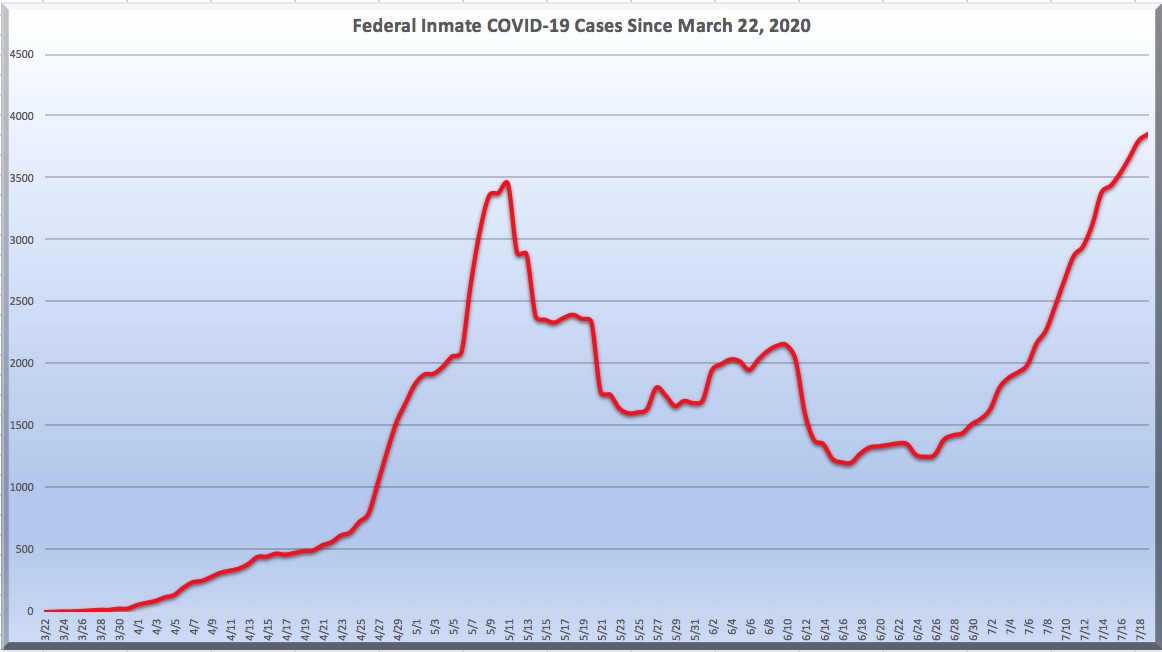We’re back after a week of vacation in the wilderness (away from COVID-19, the Internet and cellphones).
We post news and comment on federal criminal justice issues, focused primarily on trial and post-conviction matters, legislative initiatives, and sentencing issues.

TWIN PEAKS
 Last week was a record-setting one for the Bureau of Prisons, and not in a good way. As of last night, 3,861 federal prisoners in BOP and private prisons (and 318 BOP staff) had active coronavirus cases (a record), in 99 BOP facilities and six private prisons, as well as 46 halfway houses (a second record). A total of 101 federal prisoners have died from COVID-19 (a third record), the latest two reported deaths from FMC Carswell and FCI Seagoville, both in the Dallas-Fort Worth, Texas, area.
Last week was a record-setting one for the Bureau of Prisons, and not in a good way. As of last night, 3,861 federal prisoners in BOP and private prisons (and 318 BOP staff) had active coronavirus cases (a record), in 99 BOP facilities and six private prisons, as well as 46 halfway houses (a second record). A total of 101 federal prisoners have died from COVID-19 (a third record), the latest two reported deaths from FMC Carswell and FCI Seagoville, both in the Dallas-Fort Worth, Texas, area.
The number of BOP COVID-19 cases has now blown past the previous record of 3,461 on May 11, 2020. But on that date, COVID-19 was present in only 51 federal prisons, about half of yesterday’s total. The BOP’s history with COVID-19 is one of twin peaks, a spike in May 11 (due largely to the rampant pandemic at FCI Terminal Island) and the current spike, due in large part to Seagoville.
The Dallas Morning News reported last Monday that FCI Seagoville announced an effort about two weeks ago to mass test inmates to identify asymptomatic prisoners. There were 61 active cases among inmates and three among employees that day. There were 882 cases as of last Tuesday. Last night, the number hit 1,122. That’s 62% of the inmate population.
One inmate quoted by the newspaper said many inmates feel certain they’ll catch it. He said the prison wasn’t prepared for the outbreak. Some inmates and their families think the virus spread in the facility through the prison staff, according to the paper. Another inmate, who spoke on the condition of anonymity because of his fear of reprisals, described health care in the facility as “spotty and inadequate,” especially at night and on weekends.
Things are not much better at FMC Carswell, the BOP’s medical facility for women. After recording two cases of COVID-19 in April, Carswell saw its third on June 29.
“After that, they started dropping everywhere,” one inmate told the Fort Worth Star-Telegram. “It’s like a scary movie.” As of last night, Carswell had 200 reported inmate cases.
 The paper reported that multiple inmates “who did not want to be named out of fear of retaliation reported… that when an inmate tests positive, her belongings are not removed from the shared living space for hours. Inmates are responsible for cleaning the infected rooms but often do not have the proper PPE, two inmates wrote. One inmate who tested positive was allowed to use a shared bathroom, which was not cleaned for hours after she used it.”
The paper reported that multiple inmates “who did not want to be named out of fear of retaliation reported… that when an inmate tests positive, her belongings are not removed from the shared living space for hours. Inmates are responsible for cleaning the infected rooms but often do not have the proper PPE, two inmates wrote. One inmate who tested positive was allowed to use a shared bathroom, which was not cleaned for hours after she used it.”
Spectrum Bay News 9 of Tampa reported last Friday that the Federal Correctional Complex at Coleman, in Sumter County, Florida, correctional officers union officials say that coronavirus cases among both inmates and staff increased at each of the four Coleman facilities last week, and that the reality is “much worse” than what is reported. Union vice president Jose Rojas complained to the news channel that because the BOP does not test everyone, “you’re walking into a mine full of bombs not knowing who is positive and who is not.”
Rojas said that with growing concern over asymptomatic carriers, the union is now considering setting up a testing site for Coleman staff. He told the Miami Herald that “two officers were working while positive for the virus.”
Since March, Spectrum Bay News 9’s sister operation, Spectrum News 13, has requested interviews with Coleman wardens and BOP officials, along with a tour of FCC Coleman. “Our requests have been repeatedly denied,” Bay News 9 reported.
The Miami Herald reported Friday that “roughly a week ago, FCI Miami had a handful of confirmed infections – not good but better than many prison compounds. Thursday, according to the Bureau of Prisons website, the number had leaped to 93, a colony of vomiting, headachy coughing captives.”
 The paper said Kareen Troitino, the FCI Miami corrections officer union president, blamed lack of protective equipment, close quarters and people going in and out. “One of the main challenges is that the Bureau of Prisons defines PPE as surgical masks and nothing more,” the Herald quoted Troitino as saying. “I get a lot of complaints from a lot of employees that they ran out of gloves and N95 masks.” he said.
The paper said Kareen Troitino, the FCI Miami corrections officer union president, blamed lack of protective equipment, close quarters and people going in and out. “One of the main challenges is that the Bureau of Prisons defines PPE as surgical masks and nothing more,” the Herald quoted Troitino as saying. “I get a lot of complaints from a lot of employees that they ran out of gloves and N95 masks.” he said.
“We are the new Wuhan, especially in Miami. It’s bad,” Rojas told the Herald. “I’m afraid for our staff.”
The more researchers learn about COVID-19, the uglier it gets. A team of British doctors warned a week ago that potentially fatal COVID-19 complications in the brain – including delirium, nerve damage and stroke – may be more common than initially thought. University College London research suggests serious problems can occur even in individuals with mild cases of the virus.
“We identified a higher than expected number of people with neurological conditions such as brain inflammation, which did not always correlate with the severity of respiratory symptoms,” Michael Zandi, of UCL’s Queen Square Institute of Neurology and University College London Hospitals NHS Foundation Trust, told Agence France-Presse.
Newsweek reported that a European Heart Journal – Cardiovascular Imaging study of 1,216 patients found that 55% of them showed heart damage resulting from COVID-19. of whom 813 had been diagnosed with COVID-19, and 298 were deemed probable cases.

The participants were from 69 countries across six continents. They each had an echocardiogram done between April 3 and 20.
Co-author Professor Marc Dweck, consultant cardiologist at the University of Edinburgh, U.K., said, “Damage to the heart is known to occur in severe flu, but we were surprised to see so many patients with damage to their heart with COVID-19 and so many patients with severe dysfunction. We now need to understand the exact mechanism of this damage, whether it is reversible and what the long-term consequences of COVID-19 infection are on the heart.”
Dallas Morning News, As coronavirus spreads through Seagoville prison, inmates and family fear ‘a waiting game’ to get sick (July 14)
Fort Worth Star-Telegram, Women say life is ‘like a scary movie’ as coronavirus spreads in Fort Worth prison (July 13)
Tampa, Florida, Spectrum Bay News 9, Prison Union Leader Says COVID-19 Outbreak at Coleman Worse Than You Think (July 17)
Miami, Florida, Herald, COVID-19 races through Miami’s federal prison (July 17)
Agence France-Presse, Brain problems linked to even mild virus infections: study (July 8)
Newsweek, Scans Reveal Heart Damage in Over Half of COVID-19 Patients in Study (July 13)
– Thomas L. Root


